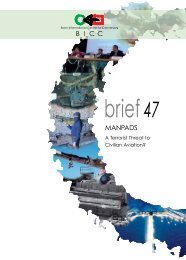egypt-final-presidential-elections-2012
egypt-final-presidential-elections-2012
egypt-final-presidential-elections-2012
You also want an ePaper? Increase the reach of your titles
YUMPU automatically turns print PDFs into web optimized ePapers that Google loves.
The Carter Center<br />
Presidential Election in Egypt<br />
Three of the appeals were dismissed by the PEC<br />
for having been filed after the deadline. 178 According<br />
to the PEC, four were dismissed because they were<br />
filed in a technically incorrect manner. 179 and because<br />
the allegations contained in the appeals, even if true,<br />
would not have affected the election results. The<br />
PEC published the decisions, which included a brief<br />
description of the rationales underpinning its decisions,<br />
on its website in early June. The Carter Center<br />
commends the PEC for publicly disseminating its first<br />
round decisions so rapidly.<br />
Regarding the second round of the <strong>presidential</strong><br />
election, the PEC acted<br />
less transparently in the<br />
dissemination of its decisions.<br />
Candidates Shafiq<br />
and Morsi reportedly<br />
filed an approximate<br />
total of 450 appeals.<br />
It is unknown to what<br />
extent individual appeals<br />
included multiple claims<br />
of electoral misconduct.<br />
To its credit, the PEC<br />
dedicated a significant<br />
portion of its announcement of the <strong>final</strong> results of<br />
the second round to a detailed verbal presentation<br />
of the decisions it took on some appeals filed by<br />
either Morsi or Shafiq, including how it adjusted vote<br />
totals in certain electoral districts based on these<br />
decisions. However, the PEC failed to publish its<br />
decisions on all the appeals filed by the candidates<br />
on its website. 180 To enhance the credibility of the<br />
process, it is essential that the PEC publish these<br />
results, with an explanation of how each decision<br />
changed official vote totals, if at all, in various electoral<br />
districts. To enable a more thorough review of<br />
postelectoral appeals, The Carter Center recommends<br />
that lawmakers consider extending the deadline for<br />
decisions on postelectoral appeals to two or even<br />
three days after candidates file their appeals with the<br />
electoral management body.<br />
To enable a more thorough review of<br />
postelectoral appeals, The Carter Center<br />
recommends that lawmakers consider<br />
extending the deadline for decisions on<br />
postelectoral appeals to two or even three<br />
days after candidates file their appeals with<br />
the electoral management body.<br />
Finally, the Carter Center urges Egypt’s leaders<br />
to take steps to consolidate and clarify its electoral<br />
dispute resolution system. To this end, The Carter<br />
Center recommends that Egypt work to establish<br />
a single, unified process for filing all electoral<br />
complaints (either with a permanent electoral<br />
management body or directly with the courts),<br />
such as through the use of a standardized complaint<br />
form available at multiple locations throughout<br />
the country, in polling stations, and online. All<br />
complaint-related decisions taken by the EMB or<br />
the courts, including actions taken by the EMB to<br />
address ongoing, on-thespot<br />
violations, should<br />
be clearly explained and<br />
written, recorded, and<br />
thoroughly publicized,<br />
to instill and promote<br />
stakeholder confidence in<br />
the electoral complaints<br />
system. Above all, to<br />
ensure that all Egyptians<br />
have the opportunity to<br />
seek redress of electionrelated<br />
complaints, it<br />
is essential that the EMB effectively educate voters<br />
and other electoral stakeholders about the electoral<br />
complaints system, including how the process works<br />
and why it is important to file a complaint if one has<br />
witnessed electoral misconduct.<br />
178 According to Article 36 of the law, candidates had until the end<br />
of the day following the filing of contested, district, general-committee<br />
results to file appeals. Since most or perhaps all district, generalcommittee<br />
results were announced on May 25 during the first round, the<br />
deadline for filing was, therefore, May 26.<br />
179 Although postelectoral appeals may reference alleged electoral<br />
violations occurring at the polling-station level, they must technically be<br />
based on decisions of a District General Committee to certify the votes<br />
of the polling stations that it oversees. Law Regulating the Presidential<br />
Election, Article 36<br />
180 In a meeting with the PEC on July 24, <strong>2012</strong>, The Carter Center was<br />
informed that given the fact that Counselor Farouk Sultan’s full speech<br />
was posted on the PEC’s website, it was not deemed necessary to publish<br />
the individual appeals results separately.<br />
65



